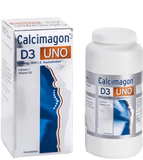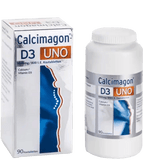Osteoporosis, CALCIMAGON D3 Uno chewable tablets
Active ingredients: calcium carbonate and colecalciferol
Areas of application Prevention and treatment of vitamin D and calcium deficiencies in the elderly.
As a vitamin D and calcium supplement to support specific osteoporosis therapy in patients at risk of vitamin D and calcium deficiency.
Note Contains isomalt (E953), soybean oil and sucrose (sugar).
For the prevention and treatment of vitamin D and calcium deficiencies.
active Osteoporosis, CALCIMAGON D3 Uno chewable tablets ingredients
- 0.02 mg cholecalciferol
- 2500 mg calcium carbonate
Osteoporosis, CALCIMAGON D3 Uno chewable tablets excipients
- lemon flavor
- sucralose
- Glycerol (mono/di) fatty acid ester
- Silica, colloidal
- Povidone K30
- Corn starch, modified
- Magnesium stearate (vegetable)
- Triglycerides, medium chain
- sodium ascorbate
- 1.5 mg sucrose
- xylitol
- DL-α-tocopherol
- 88.6 mg isomalt
indication Osteoporosis, CALCIMAGON D3 Uno chewable tablets
- The medicinal product is a white, round chewable tablet containing the substances calcium and vitamin D3, which are important for bone formation. The medicine is used to prevent and treat calcium and vitamin D deficiencies in the elderly and as an add-on treatment to support specific osteoporosis therapy.
Osteoporosis, CALCIMAGON D3 Uno chewable tablets dosage
- Always take this medicine exactly as described or as your doctor or pharmacist has told you. Please check with your doctor or pharmacist if you are not sure.
-
Dosage:
-
The recommended dose is:
- 1 chewable tablet daily.
-
Use in children and adolescents
- The chewable tablets are not intended for use in children and adolescents.
-
The recommended dose is:
-
If you take more than you should
- If you take more than you should, talk to your doctor or pharmacist straight away.
-
If you forget to take a dose
- Do not take a double dose to make up for a forgotten dose.
- If you have any further questions on the use of this medicine, ask your doctor or pharmacist.
Osteoporosis, CALCIMAGON D3 Uno chewable tablets way
- You can suck or chew the tablet.
side effects
- Like all medicines, this medicine can cause side effects, although not everybody gets them.
- Hypersensitivity reactions have occurred with an unknown frequency (cannot be estimated from the available data). If you experience the following symptoms such as swelling of the face, tongue, lips (angioedema) or swelling of the throat (larynx oedema), you should contact your doctor immediately.
-
Possible side effects:
-
Uncommon (may affect up to 1 in 100 people)
- With high doses, the calcium levels in the blood (hypercalcaemia) or urine (hypercalcuria) can increase excessively.
-
Rare (may affect up to 1 in 1,000 people)
- Constipation, indigestion, gas, nausea, abdominal pain, diarrhea.
-
Very rare (may affect up to 1 in 10,000 people)
- itching, rash. hives. Milk-alkali syndrome (also known as Burnett's syndrome) usually only occurs after excessive calcium intake. The symptoms are frequent urination, headache, loss of appetite, nausea or vomiting, unusual tiredness or weakness, together with increased blood calcium levels and kidney dysfunction.
-
Uncommon (may affect up to 1 in 100 people)
- If you have impaired kidney function, you may be at risk of increased levels of phosphate in the blood, the formation of kidney stones and increased levels of calcium in the kidneys.
- If you get any side effects, talk to your doctor or pharmacist. This also applies to side effects that are not specified.
interactions
-
Taking with other medicines
- Tell your doctor or pharmacist if you are taking, have recently taken or might take any other medicines.
- The absorption of tetracycline preparations (antibiotics) can be influenced by the simultaneous intake of calcium carbonate. For this reason, tetracycline-containing medicines should be taken at least 2 hours before or 4 to 6 hours after ingestion.
- Bisphosphonate preparations (used to treat osteoporosis) should be taken at least 1 hour before the chewable tablets.
- Calcium can reduce the effect of levothyroxines (given to treat thyroid hormone deficiency). Therefore, please take levothyroxine at least 4 hours before or 4 hours after the chewable tablets.
- The effect of quinolone antibiotics can be reduced with the simultaneous administration of calcium. Please take quinolone antibiotics 2 hours before or 6 hours after the chewable tablets.
- Calcium can reduce the absorption of iron, zinc and strontium ranelate. Therefore, please take medicines containing iron, zinc and strontium ranelate 2 hours before or 2 hours after the chewable tablets.
-
Other medicines that the chewable tablets affect or could affect the chewable tablets:
- Thiazide-type diuretics (used to treat high blood pressure and oedema).
- cardiac glycosides (used to treat heart disease).
- Orlistat (used to treat obesity) can reduce the absorption of fat-soluble vitamins such as B. vitamin D3, interfere.
- If you are taking any of the medicines listed above, your doctor will give you further instructions.
-
Take with food and drink
- The medicine can be taken with or without food or liquid.
Contraindications
-
The drug must not be taken
- If you are allergic to calcium, vitamin D or any of the other ingredients of this medicine.
- If you have severe kidney impairment.
- If you have high levels of calcium in your blood or urine.
- If you suffer from kidney stones.
- If you have too high a level of vitamin D in your blood.
pregnancy and breast feeding period
- If you are pregnant or breast-feeding, think you may be pregnant or are planning to have a baby, ask your doctor or pharmacist for advice before taking this medicine.
-
pregnancy
- If you are pregnant, you can take the medicine in case of calcium or vitamin D deficiency. During pregnancy, you should not take more than 2,500 mg of calcium and 4,000 IU of vitamin D per day, as overdoses can harm the unborn child.
-
lactation
- The drug can be taken while breastfeeding. Calcium and vitamin D3 pass into breast milk. This should be considered if the child is given additional vitamin D.
patient Osteoporosis, CALCIMAGON D3 Uno chewable tablets notes
-
Warnings and Precautions
-
Talk to your doctor or pharmacist before taking this medicine
- If you are receiving long-term treatment, particularly if you are taking diuretics (used to treat high blood pressure or edema) or cardiac glycosides (used to treat heart disease) at the same time.
- If you suffer from impaired kidney function or are prone to severe stone formation.
- If you suffer from sarcoidosis (an immune system disease which can lead to increased levels of vitamin D in the body).
- If you have immobilization osteoporosis.
- If you use other preparations containing vitamin D. Calcium and vitamin D should only be taken under close medical supervision.
-
children and young people
- The medicine is not intended for use in children and adolescents.
-
Talk to your doctor or pharmacist before taking this medicine
-
Driving and using machines
- The medicine has no known influence on the ability to drive and use machines.




